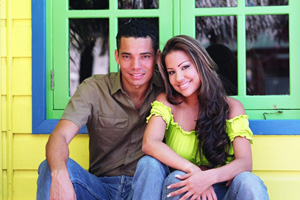Puerto Rico
Education in Puerto Rico
Education in Puerto Rico is modeled after the education system in the mainland United States. Children are required to attend school between the ages of five and eighteen with the first six years consisting of a primary education. The Constitution of the Commonwealth of Puerto Rico grants the citizens of Puerto Rico the right to a free and equal education, eliminating the costs of attending primary and secondary public schools. However, despite the similarities to the mainland, the education system in Puerto Rico continues to struggle. There are various problems that prevent successful completion of school for many Puerto Rican citizens resulting in one of the highest dropout rates in the country.

- 19.10% of all students do not finish 9th grade.
- The high school graduation rate within the last year was 80% with some schools having a graduation rate as low as 40-49%.
- In 2018, the government of Puerto Rico closed 283 schools, due to various reasons including low funding, which resulted in the loss of about 38,762 students.
- Teachers’ salaries have not increased since 2008 with new teachers earning $1750 a month despite the fact that the cost of living is 10% higher than on the mainland.
- School funding was cut after two severe hurricanes devastated the island which resulted in some schools not having electricity or running water.
- Only 12% of students in Puerto Rico scored at or above grade level in fourth grade compared to 79% of students in the continental United States.
- Only 6% of students in Puerto Rico scored at or above grade level in eighth grade compared to 68% of students in the Continental United states.
LULAC Supports
- The allocation and distribution of funds for Puerto Rico in the areas of infrastructure so that they may rebuild their schools and provide necessary utilities that were damaged from the recent hurricanes.
Representation and Voting
The citizens of Puerto Rico continue to be underrepresented and disenfranchised in the United States. With an inability to vote at the federal level and a complete lack of representation in the federal government, Puerto Ricans are completely left out of national politics despite their social and economic contributions to the United States. LULAC does not support this ‘separate but equal’ approach taken by the U.S. government when dealing with the future of the Hispanic American population.

- The establishment of separate treatment in regards to territories and states was upheld in the Supreme Court Case Balzac vs. Puerto Rico which states that certain provisions of the U.S. constitution do not apply equally to territories.
- Millions of American citizens remain disenfranchised at the national level as a result of this unequal treatment that includes the stripping of national voting power for any American citizen who moves to Puerto Rico.
- Puerto Rico is not entitled to any electoral votes and, therefore, has no say in presidential elections.
- Puerto Rico has one delegate in the House of Representatives known as the Resident Commissioner who is unable to cast votes and is effectively powerless in the legislative process.
- Puerto Rico has no representation in the Senate.
- In 2010, the United States Court of Appeals upheld Igartúa vs.U.S. which stated that the Constitution does not explicitly guarantee the right to vote for Puerto Ricans.
LULAC Supports
- The federal enfranchisement Puerto Ricans through inclusion in federal elections.
- Earned Income Tax Credit Equity for Puerto Rico Act of 2021 (H.R. 105) which amends the Internal Revenue Code of 1986 to allow residents of Puerto Rico to be eligible for earned income tax credit.
- The Child Credit Equity of Puerto Rico Act (H.R. 106) which amends the Internal Revenue Code of 1986 to allow residents of Puerto Rico to claim the refundable portion of the child tax credit in the same manner as mainland U.S. citizens.
Statehood
Puerto Rican citizens have overwhelmingly supported statehood for Puerto Rico. Some benefits of Puerto Rican statehood include representation in Congress, the ability to vote and influence national elections, and increased funding for social services and programs, such as Medicaid.

- In 2012, the citizens of Puerto Rico were presented with a referendum which contained two questions: the first question asked whether they agreed with territorial status while the second question asked them to indicate a political status that they preferred from the options of statehood, independence, or a sovereign nation in free association with the United States. Of those who answered the first question, 54% answered in disagreement with Puerto Rico’s territorial status while 46% agreed with such status. Of those who answered the second question, 61.2% chose statehood.
- In 2017, another referendum was held in Puerto Rico which offered three options: statehood, independence/free association, and territorial status. Of those who participated 97.18% chose statehood while 1.5% and 1.32% chose independence and territorial status respectively.
- In 2020, another referendum was held with one question on the referendum: “Should Puerto Rico be admitted immediately into the Union as a state?” 52.52% voted yes while 47.48% voted no.
- Representative Darren Soto, Senator Martin Heinrich, and Delegate Jenniffer González-Colón plan to introduce a bill that would set up the possibility of Puerto Rican statehood. With the endorsement of Puerto Rican Governor Pedro Pierluisi, this bill experiences large support from Puerto Rico itself.
LULAC Supports
- Seek parity in all federal benefits, especially those intended to provide benefits to low- income Puerto Ricans and alleviate poverty such as EITC, CTC, Pandemic EBT, and end all federal block grant programs including Medicaid and NAP.
- Include all residents of Puerto Rico in the Supplemental Security Income (SSI) program.
- Representation for Puerto Ricans at the national level equated to that of other states.
Puerto Rico and COVID-19 Relief
Puerto Rico has been hit by several deadly hurricanes that have devastated the island’s economic and environmental crisis. The COVID-19 pandemic with its social and economic consequences have exacerbated Puerto Rico’s precarious circumstance. The island continues to struggle against COVID-19 while experiencing a shortage of medical supplies creating a roadblock in contact tracing and testing. Today, although Puerto Rico is making an effort to distribute vaccines in a timely manner, they lack vaccines and an accessible distribution plan that would encompass the entire population.

- Puerto Rico has experienced over 135,500 COVID-19 cases which has resulted in 2066 COVID related deaths.
- 85.71% of health centers in Puerto Rico determined the biggest challenge in deploying the COVID-19 vaccine will be an insufficient supply of the vaccine.
- Less than 50% of health centers in Puerto Rico reported having enough PPE to last a whole month. This included surgical masks, N95/PPR masks, gowns, gloves, goggles, and face masks.
- In April of 2020, the Government of Puerto Rico received over $2.2 billion from the U.S. Treasury Department as part of the CARES stimulus package, which they planned to allocate to testing, contact tracing, isolation and treatment, reactivating the economy and protecting jobs, and government service continuity.
- As of February, Puerto Rico has received over 630,000 Covid-19 doses. Of these, at least 598,000 have been distributed across the island and over 418,000 have been administered. However, only 13% of the island’s population have received at least one dose.
LULAC Supports
- Ensure that COVID relief is distributed and released in a timely and legal manner, without additional restrictions and barriers to access that are not required of other entities.
Puerto Rico and Human/Equal Rights
Puerto Rico continues to be subjected to significant human rights abuses that include misogynist and homophobic actions. Civil rights organizations and activists demanded a state of emergency due to the high number of gender-based violence cases. Although former Governor Vazquez declared a state of national alert, the measure fell short of the demands of women’s organizations. Additionally, activists are urging the government and Governor Pedro Pierluisi to add the entire LGBTQ community to the gender violence emergency declaration that was announced late January of 2021. Puerto Rico has presented a bill that prohibited health professionals from offering “conversion therapies”. However, the bill failed to prohibit religious organizations from providing such therapies. Now, the LBGTQ community is once again being targeted and experiencing acts of violence.

- Within the first six months of 2019, the police received 3,880 reports of domestic violence and by August nine women had been killed as a result of domestic violence.
- In September of 2019, the Department of Forensic Science had a backlog of at least 2,000 unprocessed rape kits.
- Puerto Rico experienced 60 femicides in 2020, which was a 62% increase from the previous year.
- Within the last year, 7 transgender persons were killed in Puerto Rico. According to the Human Rights Campaign, Puerto Rico has experienced the highest number of killings in over a decade. Within the past 2 years there have been at least 10 deaths of LGBT individuals.
LULAC Supports
- Update the language civil code to include the word ‘discrimination.'
- A coordinated effort between government and non-governmental organizations to put an end to gender violence.
Housing and Infrastructure
Natural disasters including Hurricane Irma and Maria from 2017 have inflicted significant damages to Puerto Rico’s infrastructure that are still subject to change. The federal response was inadequate and slow, which caused a widespread deprivation of residents with thousands of storm-related deaths. This hit, alongside other deadly natural disasters, left poor housing conditions and various communities in need of attention. The lack of bipartisan support towards Puerto Rico’s earthquake supplemental appropriations bill caused further damages to the islander’s infrastructure and increased poverty rates. Almost all of Puerto Rico has sectors with informal housing and an exorbitant amount of abandoned spaces. Biden’s federal mission to fund Puerto Rico’s disaster reconstruction will provide the long-term support needed for recovery. The goal is to assist families whose homes have been affected and identify people in need of aid. This would be done alongside rebuilding communities to withstand future storms. The long-overdue disaster relief aid will be utilized to assist Puerto Rico’s housing and infrastructural issues.

- The American Society of Civil Engineers gives Puerto Rico’s infrastructure an overall grade of “D-”.
- The number of deaths reported after Hurricane Maria in Puerto Rico was estimated to be 4,645, many of which are linked to infrastructural damages.
- In 2017, 70,000 people were encouraged to evacuate for imminent danger related to fully-flooded communities and lack of electricity coming into northwestern San Juan, Puerto Rico.
- According to Jenniffer Gonzales-Colon, Puerto Rico’s non-voting representative in Congress, the average beneficiary in 2019 received $551 per month despite the noted 40% poverty rate.
- The administration plans to release $1.3 billion that was meant to help Puerto Rico rebuild after Hurricane Maria in 2017, and will remove restrictions on another $4.9 billion.
LULAC Supports
- President Biden’s plan to release $1.3 billion in disaster relief aid to Puerto Rico.
- The U.S Department of Housing & Urban Development (HUD) and the Puerto Rico Housing Department’s Annual Action Plan. The Community Development Block Grant (CDBG-MIT) and (CDBG-DR) fund recovery efforts in infrastructure, housing and economic revitalization programs in the U.S. Virgin Islands & Puerto Rico.
- The distribution of federal relief without imposing additional controls that are not required of other local governments.
Events
|
Puerto Rico Hill Visits |
Puerto Rico Visita al Congreso |
| Groups | Meetings |
|
Group 1: |
Office of Senator Marco Rubio |
|
Group 2: |
Office of Senator Bob Casey |
|
Group 3: |
Office of Representative Mike Quigley |
|
Group 4: |
Office of Representative Ted Deutch |
|
Group 5: |
Office of Senator Pat Toomey |
|
Group 6: |
Office of Representative Darren Soto |
LULAC Resolutions Related to Puerto Rico
LULAC News & Alerts About Puerto Rico
Jul 30, 2022
LULAC Fights Corrupt Attempt At Hostile Takeover
Jul 30, 2022



